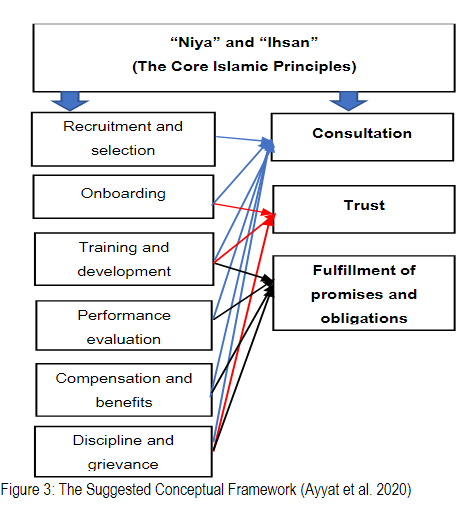Conceptualising Islamic Human Resource Management Principles in the Context of Palestine
DOI:
https://doi.org/10.37231/jmtp.2020.1.2.21Abstract
Purpose - The purpose of this study is to conceptualise Human Resource Management Principles in the context of Palestine by investigating the current and standard practices of Islamic HRM principles in the West Bank in Palestine. The primary focus is more on the implementation and awareness about Islamic HRM principles in the large institutions and organisations including governmental and non-governmental influential bodies like banks, universities, ministries and other key organisations.
Approach – The paper takes the form of a qualitative approach based on an extensive review of relevant literature. It examines the different available research works and studies done in the field of HRM and Islamic Human resources in the West Bank in Palestine. It aims to summarise the current trends and possible future implications of the present behaviours and practices in the Palestinian organisations and their awareness about the importance of Islamic HRM.
Findings – The reviewed literature reveals a considerable misunderstanding of the critical concepts of the Islamic HRM and a lack of awareness about their nature and importance to the organisations. Although most organisations claim that their practices are in line with the principles of Islam and they care a lot about fair treatment and honesty, nevertheless the reality is that the literature reveals a minimal implementation of these principles. Furthermore, the Israeli occupation has created many limitations on Palestinian organisations.
Research limitations – The limitations that this study faced are the lack of data from primary resources and official data. Furthermore, there is a lack of research papers on Islamic HRM in the Palestinian context because of the limited resources and empirical studies in this area.
Value –The study has an excellent value for decision-makers and policymakers in Palestine and shows them the importance of implementing Islamic HRM for their organisations
Downloads
References
Abdulmajeed, a. (2016, January). Employer -Employee Obligations In Islam. Retrieved from linkedin: https://www.linkedin.com/pulse/employer-employee-obligations-islam-ajmal-bin-abdul-majeed
Akhter, W; Malki, N. (2015). Impact Of Islamic Hr Practices On Job Satisfaction: An Empirical Study Of Banking Sector In Pakistan.AlArimy, A. S. (2015). Islamic and western approaches to Human Resources Management in Organisations: A practical approach. . International Journal of Information Technology and Business Management. 29th July 2015. Vol.39 No. 1 , 1-13.
AlOrfi, S. (2012). Human Resources Management from an Islamic Perspective. Journal of Islamic and Human Advanced Research 2 (2012) 86-92
Byars, L., & Rue, L. (2006). Human resource management (6") Irwin McGraw-Hill. New York.
Budhwar, P. S., Mellahi, K., & Hashim, J. (2010). The Impact of Human resource management practices on organisational commitment. Personnel Review.
Crisis Group. Who Governs the West Bank? Palestinian Administration under Israeli Occupation. Retrieved from https://www.crisisgroup.org/middle-east-north-africa/eastern-mediterranean/israelpalestine/who-governs-west-bank-palestinian-administration-under-israeli-occupation
Edward Freeman, A. C. (2004). Stakeholder Theory and the "The Corporate Objective Revisited". Organisation Science Vol 15. N.3, 364-369.
Islam, K. M., & Barghouthi, O. A. (2017). Human Resource Management: An Islamic Perspective. International Journal of Islamic Business & ManagementVol. 1, No. 1; , 10-13
Jouda, A. A., Ahmad, U. N. U., & Dahleez, K. A. (2016). The Impact of Human Resource Management Practices on Employees Performance: The Case of Islamic University of Gaza in Palestine. International Review of Management and Marketing, 6(4), 1080-1088.9-
Kadhim, A. S., Ahmad, S. B., Owoyemi, M. Y., & Ahmad, M. (2017). Islamic ethics: The attributes of Al-Ihsan in the Quran and its effects on muslim morality. International Journal of Business and Social Science, 8(11), 2219-1933.
Khan, B., Farooq, A., & Hussain, Z. (2010). Human resource management: an Islamic perspective. Asia-Pacific Journal of Business Administration, 2(1), 17-34.
Khan, S. (2016). Islamic Perspective of Human Resource Management: Some Salient Features. Dialogue (Pakistan), 11(1).
Mehmood, Z. U. I., & Arif, M. I. (2011). Leadership and HRM: Evaluating new leadership styles for effective human resource management. International Journal of Business and social science, 2(15).
Mellahi, K. (2007). The effect of regulations on HRM: private sector firms in Saudi Arabia. The International Journal of Human Resource Management, 18(1), 85-99.
O'riordan, J. (2017). The practice of human resource management. Research Paper, 20.
Rahman, D. F. N. (2018). Islamic Approaches to Human Resource Management in Organisations. International Journal of Development Research, 8(10), 23542-23546.
Palestinian Authority, (2012). Sustainable Development Under Israeli Occupation: Achievements And Challenges. Palestine's Report to the United Nations Conference on Sustainable Development, Rio de Janeiro, 20 - 22 June 2012
Rahman, N. M. N. A., Alias, M. A., Shahid, S., Hamid, M. A., & Alam, S. S. (2013). Relationship between islamic human resources management (IHRM) practices and trust: An empirical study. Journal of Industrial Engineering and Management (JIEM), 6(4), 1105-1123.
Rahman, K. U., Akhter, W., & Khan, S. U. (2017). Factors affecting employee job satisfaction: A comparative study of conventional and Islamic insurance. Cogent Business & Management, 4(1), 1273082.
Sahih Muslim. (n.d). Seidu, A. M. (2006). Islamic concept of employer-employee relationships. Jeddad, Islamic Economics Research Centre.
Tayeb, M. (1997). Islamic revival in Asia and human resource management. Employee relations, 19(4), 352-364.
The Holy Quran.
United Nations. (2016). Economic costs of the Israeli occupation for the Palestinian people. General assembly. 21 July 2016.
Uyun, Q. (2018). The Influence of Islamic HRM Practices on Organizational Learning and Its Impact on Environmental, Social and Religious Performance. Journal of Entrepreneurship Education.






















